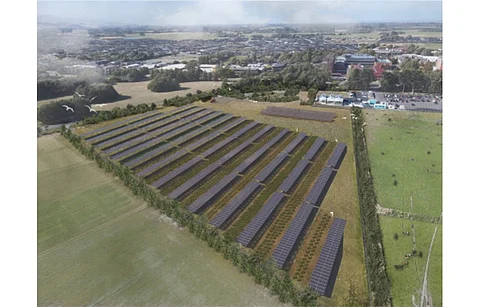

Lincoln University of New Zealand says it is planning a high-value agrivoltaics project
A 1.5 MW solar array will be accompanied by a smaller array with multiple technologies for research purposes
It plans to grow blueberries, ranui berries or snowberries, among others on site that’s targeted to be completed by mid-2025
New Zealand’s Lincoln University is planning an agrivoltaic farm to demonstrate the productivity of land as a commercial-scale solar energy generator and high-value horticulture crops producer. It will be the 1st demonstration of high-value agrivoltaics in Aotearoa, New Zealand, it explained.
Planned to have 1.5 MW solar PV capacity, it will be equipped with around 2,800 bifacial panels to generate close to 2.3 GWh of renewable energy annually. Panels will be installed on a state-of-the-art east-west tracking system with 2 different height configurations. This will be done to enable commercial crop production alongside and underneath the panel structures.
According to the university, it may plan to grow blueberries, ranui berries or snowberries on location.
Next to the main array, it will install a smaller array for multi-use research with complete manual control, different height and panel configurations and different panel technologies, shared the university.
“The Energy Farm will showcase multi-use methodologies for productive land, while also providing a platform for ongoing innovation and research in agricultural practices, systems and outcomes,” said the Lincoln University Vice-Chancellor, Grant Edwards.
Renewable energy company Solar Bay will help the university install the PV systems on land owned by the university, targeting a completion date of mid-2025. It will generate approximately 3.56 GWh annually and cover 18% of the campus’ annual electricity needs after the heating system is upgraded to 100% electric power.
Excess electricity will be donated to the nearby community during low-demand periods like the end-of-year break and summer weekends. The Lincoln University Energy Farm is currently under review for resource consent.
According to the university, learnings from the project in terms of impact of biodiversity, and crop trials, etc., will enable such projects to be replicated and rolled out across the country and even beyond the borders.
Agrivoltaics are being increasingly explored in New Zealand, a country where agriculture is said to be a significant contributor to the tradeable economy. Earlier this year, Lodestone Energy secured official consent for its 3 agrivoltaic projects (see New Zealand Green Signals New Agrivoltaic Farms).
